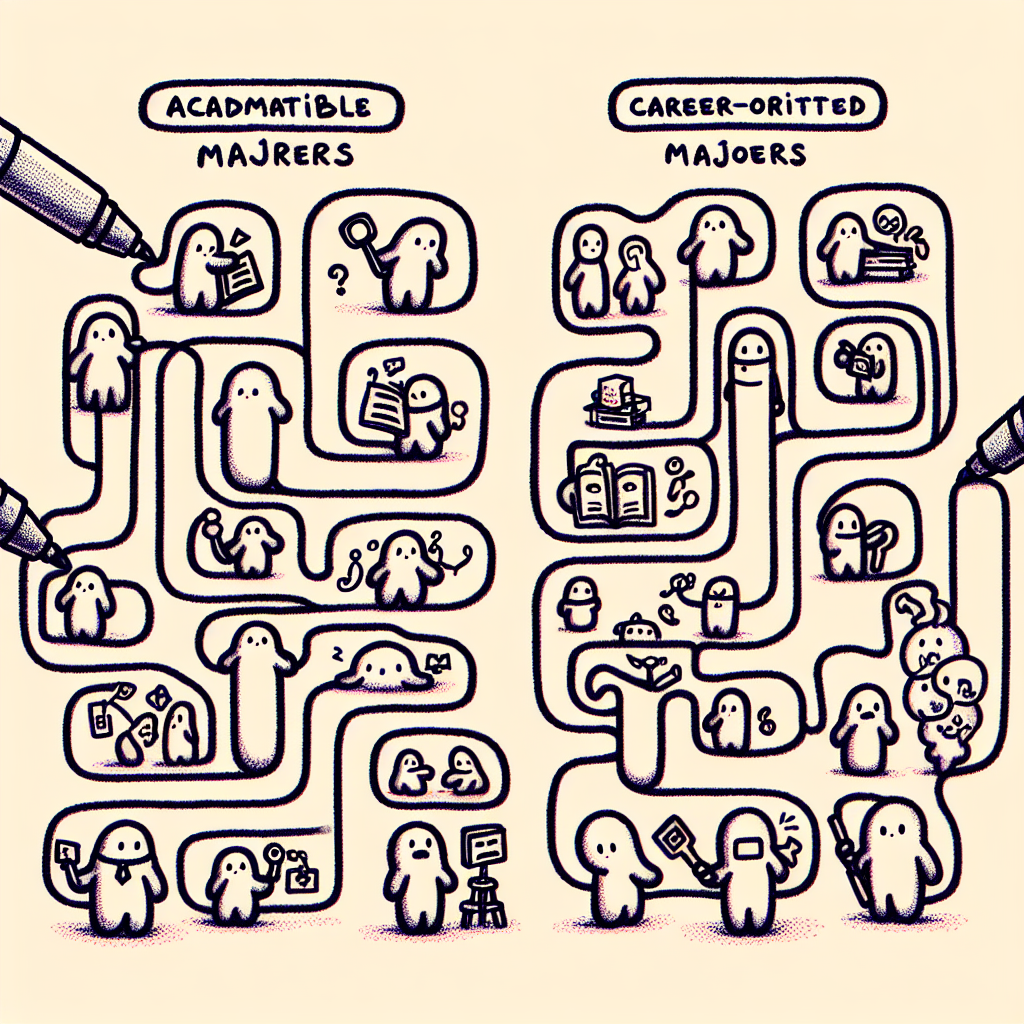Introduction
Choosing the right college major is a critical decision that can significantly influence your future. The major you select shapes not only your academic experience but also your career opportunities, earning potential, and long-term job satisfaction.
The best majors to take often align with growing industries and in-demand skills, which can lead to more job options and higher salaries after graduation. For example, majors in technology, healthcare, and business consistently offer strong career prospects due to ongoing demand in these sectors.
Beyond immediate job outcomes, your college major can affect how satisfied you feel with your education. Students who choose majors that align with their interests and strengths often report higher engagement and fulfillment during their studies.
Flexibility is another key factor in major selection. Some majors offer a broad foundation that allows graduates to pursue multiple career paths, making them a smart choice in a rapidly changing job market. Long-term planning is essential—consider how your chosen field might evolve over time and whether it prepares you for future advancements or changes in the industry.
In short, identifying the best majors to take involves assessing personal interests, career goals, and the evolving demands of the workforce.

Trends in Major Selection and Changes
📊 How Often Do Students Change Their Majors?
When considering the best majors to take, it's important to understand how often students change paths. According to the National Center for Education Statistics (NCES), approximately 30% of undergraduates change their major at least once within their first three years of enrollment. Notably, students who initially choose mathematics as their major have the highest change rate, with 52% switching to a different field.
These statistics highlight the importance of early academic advising to help students make informed initial choices. They also underscore the need for flexibility in general education programs so students can explore different disciplines before committing to a specific path.
📈 Why Students Change Majors
There are several common reasons students shift from their original major, which directly impacts how we think about the best majors to take:
- Lack of interest or mismatch with skills: Students may discover that their initial choice doesn't align with their passions or strengths.
- Career outlook or job market concerns: Some students change majors after learning more about job prospects or earning potential in their chosen field.
- Academic difficulty or workload: The rigor of coursework in certain majors can lead students to seek alternatives that better fit their academic capabilities.
Understanding these trends is essential for students as they evaluate the best majors to take and prepare for a successful academic and professional journey.

Categories of College Majors
🎓 Academic vs. Career-Oriented Majors
College majors are often grouped into two broad categories: academic and career-oriented. Academic majors include disciplines such as the humanities, social sciences, and natural sciences. These fields typically focus on theoretical knowledge, critical thinking, and research skills. Common examples are English, sociology, biology, and history.
Career-oriented majors, on the other hand, are designed to prepare students for specific professional paths. Fields such as engineering, business, and health sciences fall into this category. These programs often include internships, certifications, and applied coursework. According to data from the NCES, individuals who choose career-oriented majors generally experience higher employment rates and earnings after graduation.
🛠️ Vocational and Technical Education
Vocational and technical education programs focus on equipping students with practical skills for immediate entry into the workforce. These majors are commonly offered at community colleges and technical schools and include fields such as automotive technology, welding, and medical assisting.
In the 1999–2000 academic year, around 70% of sub-baccalaureate students were enrolled in vocational majors, reflecting their importance in workforce development (NCES). These programs emphasize job placement and hands-on experience, making them a strong option for students seeking direct career entry.
When considering the best majors to take, understanding the differences between academic, career-oriented, and vocational paths is essential to align education with career goals.

Evaluating the Best Majors: Criteria to Consider
💼 Employment and Salary Prospects
When determining the best majors to take, one of the most important factors to consider is future employment and earning potential. According to data from the Bureau of Labor Statistics (BLS), STEM (Science, Technology, Engineering, and Mathematics) and health-related majors generally offer higher starting salaries and strong job growth. Majors such as computer science, nursing, and engineering consistently rank high in both median income and job availability. Reviewing BLS resources can provide students with up-to-date information on job outlook, helping to make informed decisions.
📘 Personal Interests and Academic Strengths
Beyond employment data, students should evaluate how well a major aligns with their personal interests and academic strengths. The best majors to take are often those that match a student’s intrinsic motivation and natural abilities. Utilizing campus career centers, aptitude tests, and academic advising can help students identify fields where they are likely to excel and remain engaged over time.
🔄 Flexibility and Transferability
Another key consideration in identifying the best majors to take is the flexibility and transferability of the degree. Majors that open doors to multiple industries or career paths provide greater long-term adaptability. For instance, degrees in business, communications, and computer science often offer diverse career options. Additionally, students may consider double majoring or adding a minor to expand their qualifications and make themselves more marketable in a competitive job market.

High-Demand and High-Value Majors
Identifying the best majors to take often starts with understanding which fields offer high demand and long-term value. Certain disciplines consistently provide strong job prospects, income potential, and versatile career paths.
💻 STEM Majors (Science, Technology, Engineering, Mathematics)
STEM majors are among the best majors to take due to their high earning potential and rapid job growth. Fields like Computer Science, Data Science, Engineering, and Biology are in strong demand across multiple industries, including technology, healthcare, and energy. These majors not only offer competitive salaries but also open doors to innovation-driven careers.
🏥 Health Majors
Health-related fields offer strong job security and the opportunity to make a meaningful impact. Majors such as Nursing, Pre-Med, and Public Health are consistently among the best majors to take because of the aging population and growing healthcare needs. These programs prepare students for essential roles in hospitals, clinics, and public health organizations.
💼 Business and Finance
Business and finance majors develop skills that are widely applicable and consistently in demand. Degrees in Accounting, Finance, Marketing, and Management are among the best majors to take for students seeking flexibility across industries. Notably, in 2005–06, business was the most popular major among American Indian/Alaska Native students (19%) (NCES).
🌍 Social Sciences and Humanities
While not always tied directly to specific careers, majors in the social sciences and humanities—such as Psychology, Sociology, History, and Philosophy—help develop critical thinking, communication, and analytical skills. These disciplines are often considered best majors to take for students planning to attend graduate or professional schools.
🎨 Creative and Performing Arts
Creative and performing arts majors, including fields like Fine Arts, Music, and Theater, are typically passion-driven. Although career outcomes can vary, combining these majors with business or marketing knowledge can enhance practical viability. For students committed to artistic paths, these can still be among the best majors to take when paired with strategic planning.

Tools and Resources for Informed Decision-Making
🔍 Data-Driven Decision Making
When evaluating the best majors to take, using reliable data sources is essential. The National Center for Education Statistics (NCES) and the Bureau of Labor Statistics (BLS) offer comprehensive, validated statistics and employment projections. These tools help students understand how different majors correlate with job placement rates, median earnings, and future job demand.
The NCES provides valuable insights into employment outcomes based on specific majors. For example, their report on the employment experiences of 1992–93 bachelor’s degree recipients offers a long-term perspective on how certain fields perform in the job market (NCES). This kind of longitudinal data is useful for students considering which academic paths offer sustainable career prospects.
🧭 Campus and Online Support Tools
In addition to statistical resources, students can benefit from support tools available on campus and online. Academic advising services help align student interests and strengths with potential majors. Career exploration platforms provide assessments and databases that match personality types and career goals with suitable fields of study.
Internship and co-op programs also play a critical role. These hands-on experiences offer students a practical preview of what working in a specific major might look like, often influencing their decision in selecting the best majors to take. Access to these tools ensures students make informed, well-rounded choices about their educational and career paths.

Special Considerations by Demographics
👥 Cultural and Ethnic Trends
When exploring the best majors to take, cultural and ethnic backgrounds often play a role in shaping students' choices. For instance, data from the National Center for Education Statistics shows that business is one of the most popular majors among American Indian and Alaska Native students. Similarly, Hispanic students are increasingly choosing health professions and related programs, reflecting both job market demand and community needs.
Representation within academic fields also influences major selection. Students are more likely to pursue majors where they see others from similar backgrounds succeeding. For example, a growing number of Black students are entering social sciences and psychology, driven in part by the desire to serve and uplift their communities. These trends highlight how cultural identity and community priorities often guide decisions about the best majors to take.
🔄 Non-Traditional and Returning Students
Non-traditional and returning students often prioritize practicality when deciding on the best majors to take. Many opt for degrees that offer a faster path to employment, such as associate degrees in healthcare, information technology, or skilled trades. These programs often align with the immediate financial and personal responsibilities that older students face.
Vocational and online degrees are also appealing to this group due to their flexibility and career-oriented focus. Fields like cybersecurity, business administration, and nursing offer online degree options that accommodate work and family obligations while still providing strong job prospects. For non-traditional students, the best majors to take are those that balance time, cost, and employability effectively.

Conclusion
Determining the best majors to take is a personal decision that depends on many factors. There is no one-size-fits-all solution—students must assess their own career goals, academic strengths, and the current demands of the job market. A well-informed choice considers both passion and practicality, ensuring that students remain motivated while also preparing for viable career paths. In an evolving job market, flexibility and adaptability are essential. Choosing a major that provides both specialized knowledge and transferable skills can offer long-term value regardless of future changes in the workforce.

References
- National Center for Education Statistics (NCES) – Major Changes
- NCES – Ten Years After College
- NCES – Vocational Education
- NCES – American Indian/Alaska Native Trends
- Bureau of Labor Statistics – Linking Majors to Careers






.png)






